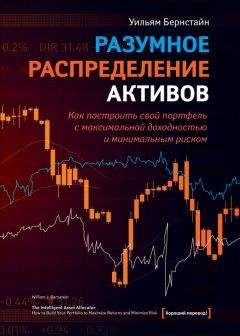Заблуждения толпы - Бернстайн Уильям Дж.
219. См.: Keise Izuma and Ralph Adolphs, “Social Manipulation of Preference in the Human Brain,” Neuron Interpersonal Dynamics Vol. 78 (May 8, 2013): p. 563–573.
220. Cм.: Daniel K. Campbell-Meiklejohn et al., “How the Opinion of Others Affects Our Valuation of Objects,” Current Biology Nol. 20, No. 13 (July 13,2010): p. 1165–1170.
221. См.: Mackay, 1:137.
222. См.: Stephen E. Ambrose, Undaunted Courage (New York: Simon and Shuster, 1996), 52. Это утверждение не совсем корректно, поскольку и голуби, и семафоры действительно способны доставлять информацию быстрее, чем лошади, но лишь в крайне ограниченных объемах.
223. См.: John Francis, A History of the English Railway (London: Longman, Brown, Green, & Longmans, 1851), 1:4–5.
224. См.: William Walker, Jr., Memoirs of the Distinguished Men of Science (London: W. Walker & Son, 1862), p. 20.
225. См.: Paul Johnson, The Birth of the Modern (New York: HarperCollins, 1991), p. 581.
226. Там же.
227. См.: Christian Wolmar, The Iron Road (New York: DK, 2014), p.22–29; и Francis 1:140–141.
228. См.: Francis, 1:94–102.
229. См.: Francis, 1:292.
230. Там же.
231. Там же, p. 288.
232. См.: Sidney Homer and Richard Sylla, A History of Interest Rates, 4th Ed. (Hoboken, NJ: John Wiley & Sons, 2005), p. 188–193.
233. См.: Bagehot, p. 138–139. Также стоит учитывать компенсацию, которая полагалась богатым рабовладельцам согласно законам 1830-х годов (из личной беседы с Эндрю Одлыжко).
234. См.: Francis, 1:290.
235. Там же, 1:293.
236. Там же, 1:289, 293–294.
237. См.: John Herapath, The Railway Magazine (London: Wyld and Son, 1836), p. 33.
238. См.: John Lloyd and John Mitchinson, If Ignorance Is Bliss, Why Aren’t There More Happy People? (New York: Crown Publishing, 2008), p. 207.
239. См.: Francis, 1:300.
240. Cм.: Andrew Odlyzko, “This Time Is Different: An Example of a Giant, Wildly Speculative, and Successful Investment Manias,” The B. E. Journal of Economic Analysis & Policy Vol. 10, No. 1 (2010), p. 1–26.
241. См.: J. H. Clapham, An Economic History of Modem Britain: The Early Railway Age 1820–1850 (Cambridge, UK: Cambridge University Press, 1939), p. 387, 389–390, 391.
242. См.: Richard S. Lambert, The Railway King (London: George Allen & Unwin Ltd., 1964), p. 30–31.
243. Из личной беседы с Эндрю Одлыжко.
244. См.: Lambert, p. 99–107.
245. Там же, p. 150–154.
246. Там же, p. 156–157.
247. Там же, p. 188–189.
248. См.: Frazar Kirkland, Cyclopedia of Commercial and Business Anecdotes (New York: D. Appleton and Company, 1868), p. 379.
249. См.: Lambert, p. 173–174; Lrancis 11:237.
250. Cм.: Lambert, p. 237. Также см. Clapham, p. 391.
251. См.: Francis 11:175.
252. См.: Lambert, p. 165.
253. См.: Francis, 11:168–169.
254. Цит. по: там же., p. 144–145.
255. Цит, по: Francis, 11:174.
256. См.: Lambert, p. 168–169.
257. См.: Francis, 11:183.
258. См.: Alfred Crowquill, “Railway Mania,” The Illustrated London News, November 1, p. 1845.
259. См.: Lambert, p. 207.
260. Cм.: Lambert, p. 200–207, 221–240; колебания цен на акции железнодорожных компаний: W. W. Rostow and Anna Jacobsen Schwartz, The Growth and Fluctuation of the British Economy 1790–1850 (Oxford: Clarendon Press, 1953), 1:437.
261. См.: Francis, 11:195–196.
262. Там же, p. 275–295; личная беседа с Эндрю Од-лыжко.
263. См.: John Lorster, The Life of Charles Dickens (London: Clapman and Hall, 1890), 11:176.
264. См.: William Bernstein, The Birth of Plenty (New York: McGraw-Hill Inc., 2004), p. 40–41.
265. См.: Charles Mackay, Memoirs of Extraordinary Popular Delusions (London: Office of the National Illustrated Library, 1852), 1:84.
266. См.: Andrew Odlyzko, “Charles Mackay’s own extraordinary popular delusions and the Railway Mania,” http://www.dtc.umn.edu/~odlyzko/doc/mania04.pdf, дата обращения 30.03.2016.
267. Цит. по: Glasgow Argus, October 2, 1845; см. Odlyzko выше.
268. См.: Andrew Odlyzko, “Newton’s financial misadventures during the South Sea Bubble,” доклад, 07.11.2017. Знаменитая цитата недостоверна и воспроизводилась из вторых рук.
Глава 5
269. См.: Stanley Schacter, “Leon Festinger,” Biographical Memoirs Vol. 94 (1994): p. 98–111, and “Doctor Claims World Will Upheave, Not End,” Pittsburgh Post-Gazette, December 17, 1954.
270. Cм.: Leon Festinger et al., When Prophecy Fails (New York: Harper Torchbooks, 1956), p. 234.
271. Там же, p. 33.
272. Там же, p. 33–51.
273. См.: “Doctor Claims World Will Upheave, Not End.”
274. См.: Festinger et al.; и Whet Moser, “Apocalypse Oak Park: Dorothy Martin, the Chicagoan Who Predicted the End of the World and Inspired the Theory of Cognitive Dissonance,” Chicago Magazine, May 20, 2011.
275. См.: Festinger et al., p. 28
276. См.: https://www.mtholyoke.edu/acad/intreFwinthrop.htm, дата обращения 14.08.2017.
277. См.: Frederick Marryat, A Diary in America (New York: D. Appleton & Co., 1839), p. 16.
278. См.: Walter Mann, The Follies and Frauds of Spiritualism (London: Watts & Co., 1919), p. 9–24.
279. См.: Sylvester Bliss, Memoirs of William Miller (Boston: Joshua V. Himes, 1853), p. 8; и David L. Rowe, Thunder and Trumpets (Chico, CA: Scholars Press, 1985), p. 9.
280. Cм.: Joshua V. Himes, Ed., Miller’s Works 1:8, http://centrowhite.org.br/files/ ebooks/apFall/Miller/Miller%27s%20Works.%20Volume%201.%20Views%20of%20 the%20Prophecies%20and%20Prophetic%20 Chronology.pdf, дата обращения 15.08.2017.
281. См.: Joshua V. Himes, Views of the Prophecies and Prophetic Chronologies, Selected from Manuscripts of William Miller (Boston: Josuhua V. Himes, 1842), p. 10.
282. См.: Rowe, Thunder and Trumpets, p. 3–6.
283. См.: Bliss, p. 47–48, 50.
284. Там же, p. 52–53. Современные объяснения: Wayne R. Judd, “William Miller: Disappointed Prophet,” in Ronald L. Numbers and Jonathan M. Butler, Eds., The Disappointed (Bloomington and Indianapolis: Indiana University Press, 1987), p. 7–19.
285. См.: Martin Gardner, Fads and Fallacies in the Name of Science (New York; Dover Publications, 1957), p. 173–185.
286. См.: Erich von Däniken, Chariots of the Gods, trans. Michael Heron (New York: Berkley Books, 1999).
287. См.: T. Rees Shapiro, “Harold Camping, radio evangelist who predicted 2011 doomsday, dies at 92,” The Washington Post, December 18, 2013.
288. См.: Gardner, p. 176.
289. Из личной беседы с Рональдом Намберсом.
290. Cм.: Christopher Hitchens, God Is Not Great (New York: Hachette Group, 2007), p. 60.
291. См.: Leroy Edwin Froom, The Prophetic Faith of Our Fathers (Washington, DC: Review and Herald, 1946); о расчетах, связанных с 1843 годом, см. p. 111 и 401–413. Желающие подробнее изучить «кроличью нору» апокалиптического воображения могут проштудировать полное четырехтомное издание: http://documents. adventistarchives.org.
292. Поскольку лабораторные записи Уэйсона не сохранились, нельзя утверждать, что эксперименты проводились именно в конце 1950-х годов, но раз итоговая работа была опубликована в 1960 году, подобный ход событий кажется вполне вероятным. См. P. C. Wason, “On the Failure to Eliminate Hypotheses in a Conceptual Task,” The Quarterly Journal of Experimental Psychology Vol. 12, Part 3 (1960): p. 129–140.
293. См.: Wason. В психологической литературе и других источниках принято заявлять, что Уэйсон в данной статье ввел в употребление термин «предвзятость подтверждения», но это не так. Соавтор Уэйсона говорит следующее: «Он вряд ли придумал это определение, от него я слышал разве что о стратегии проверок» (из личной беседы с Филипом Джонсом-Лэйрдом). Что касается термина, он появился, насколько можно судить, в 1977 году.



